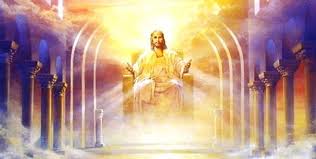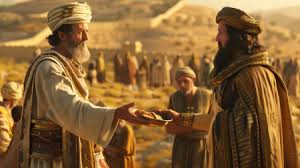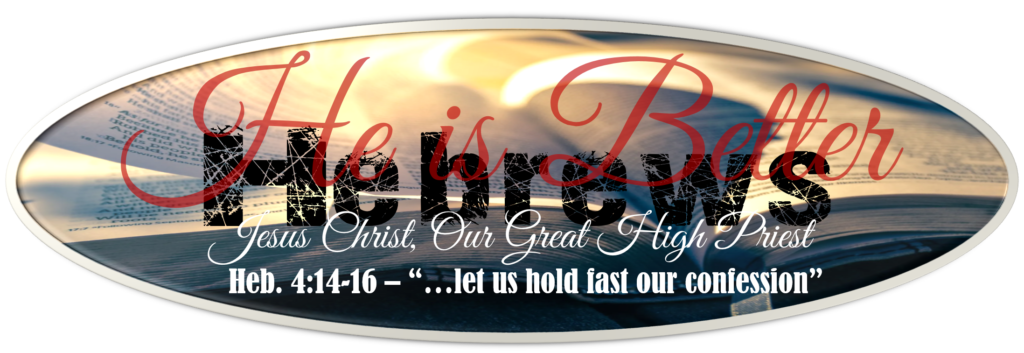Hebrews 6:9-7:28
Jesus, our Great High Priest
In this passage, it’s clear that the writer has found his “second wind”. Note that this section begins after concluding his thoughts of warning about being an immature Christian. He has made it clear to his audience that Christian living needs to be clear-thinking![]() and serious, and be progressing towards maturity in Christ. That third warning confronted his readers not be dull or immature but to “grow up”, and it may have been uncomfortable to some. Now the writer wants to pick up where he left off, which you may recall is where he brought up Melchizedek but regretted his listeners may not be mature enough to hear those truths. Now he wants to strengthen his listeners and encourage faith in Jesus as their Great High Priest. He fills his thoughts with profound phrases that require careful attention as he seeks to guide them to have confiden
and serious, and be progressing towards maturity in Christ. That third warning confronted his readers not be dull or immature but to “grow up”, and it may have been uncomfortable to some. Now the writer wants to pick up where he left off, which you may recall is where he brought up Melchizedek but regretted his listeners may not be mature enough to hear those truths. Now he wants to strengthen his listeners and encourage faith in Jesus as their Great High Priest. He fills his thoughts with profound phrases that require careful attention as he seeks to guide them to have confiden ce in their walk with Christ. The writer moves from warning to encouragement as he lifts up the glories of Jesus Christ as our Great High Priest, a theme he began writing about in Heb. 4:14. One of the key ways he does this is by placing Christ within the larger history of how God has revealed and executed His plan of Redemption. Two ancient characters take center stage, Abraham and Melchizedek and then his teaching moves forward as he reviews the Aaronic priesthood and its relationship to Christ. Recall that the key theme of Hebrews is that “Christ is Better”, and the writer is going to demonstrate that now by the superiority of Jesus’ priesthood over that of Aaron. This is the primary doctrine of the book which is the subject all the way to Heb. 10:18.
ce in their walk with Christ. The writer moves from warning to encouragement as he lifts up the glories of Jesus Christ as our Great High Priest, a theme he began writing about in Heb. 4:14. One of the key ways he does this is by placing Christ within the larger history of how God has revealed and executed His plan of Redemption. Two ancient characters take center stage, Abraham and Melchizedek and then his teaching moves forward as he reviews the Aaronic priesthood and its relationship to Christ. Recall that the key theme of Hebrews is that “Christ is Better”, and the writer is going to demonstrate that now by the superiority of Jesus’ priesthood over that of Aaron. This is the primary doctrine of the book which is the subject all the way to Heb. 10:18.
“Those who have gone on before”… a special phrase which can mean a lot to us. We treasure what we have as our heritage, for our home country, for our own family heritage, for our church, or for any other entity you have been a part of, but especially for the heritage we have in our faith in God. As a Christian in the Church Age, our faith heritage is anchored in Jesus Christ, the Final Forerunner of Redemption (6:20). However Hebrews 6:9-7:28 reminds us that our heritage goes back all the way back to Abraham, the first Forerunner of Redemption and also includes another forerunner, Melchizedek. As God began to reveal and execute His grand plan for redemption, the plan included revelation from God in both of these men. He was revealing His desire for fellowship with man in His holiness, His forgiveness of sin and provision of redemption through works of sacrifice. We marvel as we see our sovereign God work to bring about the intersection of these two great men’s lives and guide them to foreshadow fulfillment of Redemption in the Messiah, Jesus Christ.
Confident of Better Things
The Hebrews writer states that “God made a promise” to Abraham (Heb. 6:13) and confirmed it with His covenant. He was the “initial Jew”, the supreme example of one ![]() who is strong in faith & patience. God first made His promise to Abraham in Gen. 12, but then in Gen. 15:1-18, He executed an “unconditional contract” with Abraham, binding the agreement with an oath backed by Himself. God established the dependability of His promises on His own character, His name. As a type of Christ, Abraham was a pioneer, he “set the mold” for the generations of Jews and Christians who were to follow. Just like the Jews, we as Christians today need a strong, faith-based character model like Abraham in our life. The writer of Hebrews introduces an important detail about Abraham which gives us an important context for the ministry of Christ as our High Priest. Isaiah 40:8: tells us “The grass withers, the flower fades, but the word of our God stands forever.” As God established His plan for Redemption with the Abrahamic Covenant, God made a series of unconditional promises to Abraham, then repeated them to his son Isaac and grandson Jacob. These promises are the foundation for the Jewish faith, and they stand as the core for all of what God reveals to us in the Bible. While God began His program with Abraham and the Jewish people, He also told Abraham that these promises would become a blessing to all nations (Gen. 11:3).
who is strong in faith & patience. God first made His promise to Abraham in Gen. 12, but then in Gen. 15:1-18, He executed an “unconditional contract” with Abraham, binding the agreement with an oath backed by Himself. God established the dependability of His promises on His own character, His name. As a type of Christ, Abraham was a pioneer, he “set the mold” for the generations of Jews and Christians who were to follow. Just like the Jews, we as Christians today need a strong, faith-based character model like Abraham in our life. The writer of Hebrews introduces an important detail about Abraham which gives us an important context for the ministry of Christ as our High Priest. Isaiah 40:8: tells us “The grass withers, the flower fades, but the word of our God stands forever.” As God established His plan for Redemption with the Abrahamic Covenant, God made a series of unconditional promises to Abraham, then repeated them to his son Isaac and grandson Jacob. These promises are the foundation for the Jewish faith, and they stand as the core for all of what God reveals to us in the Bible. While God began His program with Abraham and the Jewish people, He also told Abraham that these promises would become a blessing to all nations (Gen. 11:3).
As the writer turns to this new area of truth, he makes several profound observations that he wants us to consider carefully. In Heb. 6:9, when he says “better things”, the writer is wanting to move away from the past elementary truths, and the preceding warning about immaturity and some believers’ carelessness with their faith. Now he wants to instill confidence in them to be strong in their faith. He addresses them as “beloved”, signaling a change in the nature of his message, and encourages them to nurture “things that accompany salvation” in their life. These “things” would include Biblical truths such as Christ’s birth, His life, His death on the Cross and Resurrection, our baptism by the Holy Spirit and the empowerment of the Spirit for our walk in Christ. These are the great truths of our salvation, not to be confused with the former false beliefs as mentioned in Heb. 6:1-2. Note that the Bible is applicable to believers of all ages. Hebrews addresses the old Jewish religious activites that displaced genuine faith in God and the Messiah, but today’s world surrounds us with many different belief systems which set aside true faith in God.
Heb. 6:11 reminds us to “show the same diligence so as to realize the full assurance of hope” – There is a goal line, as described in verse 11, the key to keep from faltering faith. Peter mentions in 2 Pet. 1:10 that we share together with other Christians in this diligence. He expands on that in 2 Pet. 1:5-8, which is a helpful list of godly characteristics that we should pursue as God’s people. Our maturity is persistence in faith, which bears fruit in our loving obedience to God. Note that this diligence often shows itself as a ministry to one another.
Serious Thoughts for Serious Christians
Note these further important comments by the writer in this great passage:
-
- 12, “be imitators of those who through faith and patience inherit the promises” – following the life-changing examples of the great heros of our faith, to be considered further in Heb. 11.
- 15, “having patiently waited, he obtained the promise” – Jesus is our supreme of example of prevailing over difficult circumstances to arrive in the presence of God.
- 17, “…the heirs of the promise”, that’s us! “…the unchangeableness of His purpose” – God, the final authority, confirms and assures us that our salvation is His work and it will not fail; the NKJV says “the immutability of His counsel” – not only it doesn’t change, but it can’t! Compare this with Paul’s statement about God in Rom. 11:33, “the depths of His wisdom”. The Bible assures us of the immutability or unchangeableness of God’s counsel. God claims two immutable or unchangeable things – His character and His promises.
- 18, “…strong encouragement to take hold of the hope set before us” – This is a profound expression of our hope in Christ – we flee to this hope, we throw our life entirely onto Go
 d’s provision. This is like the Old Testament provision by God for the guilty person to flee to the city of refuge and life
d’s provision. This is like the Old Testament provision by God for the guilty person to flee to the city of refuge and life - 19, “This hope we have as an anchor of the soul” – In Hebrews, our hope in Christ is never a subjective attitude (if this or that happens), but rather an expression of an established objective (already proven true) content. Weirsbe tells us that at least 66 drawings of anchors were discovered in the catacombs under Rome done by Christians in captivity under Nero, indicating the popularity of the anchor as a Christian symbol of hope in Christ. Compare Tit. 2:13 & 1 Jn. 3:3.
- 20, Jesus is our Forerunner “having become a high priest forever…” The forerunner is the One that carries the anchor (His finished work on the Cross) to the shore (salvation, eternity in God’s presence). Christ has secured our salvation into the harbor, “within the veil”, in the Holy of Holies.
This series of rich observations about Jesus Christ is like working in a gold mine and after doing some serious digging, we burst open a rich major vein of gold! What a privilege it is for each of us to know that in Christ, we will inherit “the riches of His glory” for all eternity (Eph. 3:15-16). The writer is going to be guiding us into the rich doctrinal truths centered on Jesus Christ and His ministry on our behalf (Heb. 7-10). In Heb. 6:20, he picks up from his reference to Melchizedek in Heb. 5:10, which caused him to pause somewhat abruptly at that point because of his concern that many of his listeners had an immature faith. He knew that he needed to be very clear about the much greater ministry of Jesus Christ, far surpassing the religious exercises of past tradition. Now, having challenged us to be serious about our life in Christ, he is going to take us into the sanctuary of Christ’s priestly work. Heb. 6:9 is the writer’s signal that he is done with the serious warning and now wants focus on the main purpose of writing – to lift high the glories of Jesus Christ our Great High Priest, a theme which will prevail through Heb. 10. The eloquent passage in Heb. 6:13-20 moves us into the deep truths now to be studies in Heb. 7-10.
Melchizedek’s Heritage, 7:11-21
As God describes the relationship between Abraham and Melchizedek in Hebrews 7, the writer says Jesus follows “after the order (or![]() example) of Melchizedek”, He is the same as Melchizedek. Hebrews gives us a preliminary reference to Melchizedek’s relationship to Christ in Heb. 5:6,10. Now the writer is going to expand God’s intent for this picture of Jesus Christ as our Great High Priest.
example) of Melchizedek”, He is the same as Melchizedek. Hebrews gives us a preliminary reference to Melchizedek’s relationship to Christ in Heb. 5:6,10. Now the writer is going to expand God’s intent for this picture of Jesus Christ as our Great High Priest.
Melchizedek is another “forerunner” (Heb. 6:20), the first priest in the Bible and existed before Abraham (Gen.14:18) . The writer of Hebrews has already introduced the subject but now he quotes Psa.110:4, understanding that this psalm is Messianic, he rightly applies the statement “You are a priest forever according to the order of Melchizedek” to Christ. The three biblical mentions of Melchizedek (Genesis, Psalms and Hebrews) are the only biblical truth we have about this strategic person. David’s psalm makes the important distinction of placing Melchizedek ahead of Abraham and as a High Priest. Note that the Aaronic priesthood didn’t appear until Moses established the Tabernacle sacrifices, so Melchizedek was also superior to Aaron. The writer’s extended discussion in Hebrews about Melchizedek’s place in God’s order of things is strategicallly important to our understanding of Jesus Christ being our Great High Priest today. This truth would have been a shock to the faithful Jew who had been raised in Jewish tradition, and would have been an important new truth to those Jews who had received  Jesus as Savior. This section on Melchizedek is the longest exposition (i.e. taking a subject, examining and explaining in detail) in the book of Hebrews. This passage leads to the next strategic chapters about Christ’s priestly ministry in heaven, so we are certainly looking at a major portion of Scripture!
Jesus as Savior. This section on Melchizedek is the longest exposition (i.e. taking a subject, examining and explaining in detail) in the book of Hebrews. This passage leads to the next strategic chapters about Christ’s priestly ministry in heaven, so we are certainly looking at a major portion of Scripture!
Melchizedek was a priest, and he “blessed” Abraham and Abraham paid a tithe to him. This elevates the biblical position of Melchizedek to that of being a priest before God. He was also a prototype of Jesus Christ, his name literally meant “King of Rightoeusness” and also “King of Peace” and he actually held both King and Priest roles. His reign was characterized by righteousness and peace (“peace” is based on the word for “shalom”) and he ruled over the city-state that became Jerusalem (Psa. 76:2). He was a prophetic picture, a “type” of Jesus Christ the Messiah. Typology became a strategic method of revealing and explaining truth in the Bible. It was a “foreshadowing” – a partial representation of a final truth not yet fully revealed. For example, in Num 21, God tells Moses to put snake on a pole and tells the people to “look & live!” This is a “type”, it “pictures” the Savior on the Cross. As alluded to in Heb. 7:3, by what God inspired Moses to write, there is no record of Melchizedek’s parents or children, and no record of his birth or death dates, so the Hebrews writer infers that Melchizedek lives perpetually. Although Genesis is full of genealogies, there is none for Melchizedek – contrast that to the Aaronic priesthood which depends entirely on genealogies.
In Heb. 7:11-25, the writer makes it clear that according to God, Melchizedek’s and Jesus’ priesthoods are superior to Aaron’s. The Mosaic Covenant and its priesthood are inferior and superseded by the coming of the Messiah and Jesus’ death and resurrection. The Aaronic priesthood wasn’t perfect (Heb. 7:11, 19, 28). As a type Christ, Melchizedek was a prototype pointing forward to Jesus Christ. Since God promised in Psalm 110:4 that the coming Messiah would be a priest after Melchizedek’s order, God intended to replace the “Levitical priesthood” because it was inadequate” (Constable). It was clear that God intended to replace the Law. The Bible’s development of God’s provision of salvation (in the OT) was anticipatory but it was not fully effective until Christ came to earth. In Christ, God’s salvation became final and complete. Many times in the Gospels, we observe the approaching “paradigm shift” from Old to New. In Christ there is a decisive shift in God’s provision of salvation – what was provisional and ineffective is now superseded by final and full salvation.
Jesus Christ, The Final Forerunner, Heb. 7:22-28
As we work through Hebrews 7, bear in mind that Heb. 7:1-10:39 can be viewed as one comprehensive exposition on the Priesthood of Christ, which closes with the exclamatory “do not throw away your confidence”. Here is a good summary of this section:
- 7: superior order, “16, the power of an endless life- 19, a better hope, through which we draw near to God”
- 8: a better covenant
- 9: a heavenly, eternal sanctuary
- 10: “one sacrifice forever”
In Heb. 7:22 there is a major transition to a final passage of exciting truth. While Melchizedek was a prophetic type of Christ, and Aaron’s priesthood served for centuries as a representative of God’s redemptive work, now the resurrected Christ is present for the rest of eternity in the presence of God as our Final Forerunner. He is declared to be God’s surety or guarantee of eternal salvation. Hebrews 6:20 tells us that Jesus has entered God’s presence as our forerunner. We now see Jesus having accomplished our Final Redemption.
We have seen that God uses “types” in the Bible as a strategic method of declaring truth. Now we see Heb. 7:25 is a transition to the major teaching in Heb. 8-10 which is the single most important exposition in the Bible about the New Covenant being accomplished in Jesus Christ. It involves an unchangeable priesthood, Jesus is able to save “to the uttermost”, that is, completely, forever. Remember that His complete salvation is accompanied by His intercession for us (Rom. 8:33-34). Our ability to be faithful isn’t based on our works – it is our confidence in Christ’s work on our behalf!
The New Covenant
Hebrews has 17 of the 29 New Testament references to the term “covenant”, and this high percentage of use in these chapters emphasizes their substantial importance at showing Christ is the “better” covenant. One of the major themes of Heb. 7-10 is Heb. 7:27, “once for all”. The New Covenant will replace the old Mosaic covenant and the Law and provide our eternal redemption.
The subject being addressed is singly important to the Christian. The fact is, there was contention between Jews who had lived according to the Old Testament law and Christians who placed their faith in the work of Christ on the Cross. Constable compares it to the accusations made by the Jewish leaders against Stephen in Acts 6:13-14 which became the prevailing argument and accusation that fueled their hatred of “The Way”. So the church members listening to this letter being read had their ears perk up as these truths were spoken.
Heb. 7:22-28 gives a summarization of Christ’s superiority over the Aaronic priesthood. He was distinctly and uniquely “holy, innocent, undefiled, and separated from sinners” (v. 26) and more importantly exalted above the heavens to the right hand of God. The Temple sacrifices which were constantly repeated were no longer necessary because of the Finished Work of Christ on the Cross. Note also that our High Priest doesn’t have to first offer sacrifices for Himself which all the OT priests had to do. Jesus’ sacrifice was accepted by the Father “once for all”. Verse 28 is a key statement – it clarifies that Jesus Christ is authenticated by the oath of God (Heb. 7:21). The “word of the oath” (Heb. 7:21, 28) is God’s authoritative final word which refers to God’s confirmation of His Son as the Messiah, a declaration that takes precedence over all OT provisions from God for regarding sin and forgiveness. Jesus Christ takes away the sins of the world and now He sits in heaven eternally with God’s oath of validation of His work which cannot be broken. There is now the unending and unchangeable priesthood of Jesus Christ (Heb. 7:24).
![]() Bible Study Journal
Bible Study Journal
-
- How does this passage apply to your life, right now?
- How does Isa. 45:23 demonstrate the final authority of God?
- Heb. 6:9, What would you suggest should be included in the “things that accompany salvation”?
- Heb. 6:18-19, what is this hope and how is it our anchor?
- “Priest” and “High Priest” are the most frequent words in Hebrews – what can we learn from these texts about Jesus Christ? Heb. 2:17; 3:1; 4:14-15; 5:1, 5-6, 10; 6:20; 7:1,3,5,11,17,21,26; 8:1, 3-4; 9:7,11,25; 10:11,21
- Christ is our safe harbor, our refuge. Consider the additional thought from each of these verses: Psa.18:1-2; Psa. 31:3; Psa. 91:2; Psa. 91:9; Psa. 94:22; Psa. 144:2; Isa. 17:10; Isa. 25:4; Jer. 16:19; Joel 3:16; Nah. 1:7
- Heb. 7:16 refers to Jesus “indestructible” or endless life. What do these additional verses provide to help understand Jesus’ eternal existence? — Micah 5:1; Jn. 8:58; 17:5; Rev. 22:13
- What do we learn from these verses about Christ’s sacrifice being completely adequate for our sin? — Heb. 2:10; 5:8-10; 7:28; 12:2; 1 Jn. 2:2
- Heb. 7:15 says that Jesus intercedes continually for us. How do these verses help understand that wonderful truth? — Lu. 22:31-32; Jn. 17:6-26; Rom. 8:33-34; 1 Jn. 2:1





